How Nancy Birdsall’s time at Yale Economic Growth Center helped her rethink global development
In the 1970s, Birdsall arrived at EGC as an untraditional economics student. Driven by a commitment to independent, policy-based research, she would go on to change how rich countries and the powerful institutions they control approach global development.
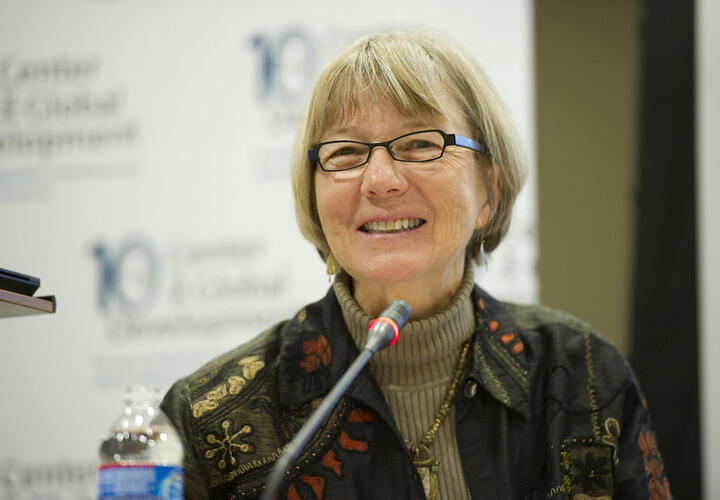
The world’s most powerful players in international development should be accountable – but to whom? Whom do they actually serve?
In 2001, Nancy Birdsall (PhD ’79) sought to address these questions when she co-founded the Center for Global Development. Under her leadership, the think tank became a leading authority on economic development, helping reform large multilateral organizations, shaping US development and aid policy under both Republican and Democratic administrations, and measuring and reporting on other rich country development programs – from aid to trade, migration, and climate policies.
Beyond founding CGD, Birdsall is known widely for her contributions to the field of international development, calling attention to the reality of asymmetric economic growth among countries and its implication of increased global inequality; introducing Cash-on-Delivery (or outcomes-based) foreign aid; and analyzing the successes and shortcomings of the Washington Consensus, a set of market-oriented economic principles widely adopted throughout Latin America in the 1980s and 90s following the debt crisis.
Yet, despite her mainstream success, Birdsall began her career as an economist on an unconventional path. After a liberal arts education (a BA in American Studies and an MA in international affairs), she became interested in economics while working at the Smithsonian Institution. Specifically, her work there was in a USAID-funded program supporting developing country scholars working on population issues. She then honed her quantitative skills as a Ph.D. student at Yale and the Economic Growth Center (EGC).
During her time at Yale, she witnessed a transformative era for the field of economic development. The traditional approach of studying national accounts and the structure of economies was expanding to bring both newly available household data and an emphasis on econometric methods to analyses of microeconomic topics like household decision-making.
It was here Birdsall gained an appreciation for the independent and unbiased policy-based research that would feature heavily in nearly every aspect of her career, from her time at the World Bank and the Inter-American Development Bank to founding the Center for Global Development.
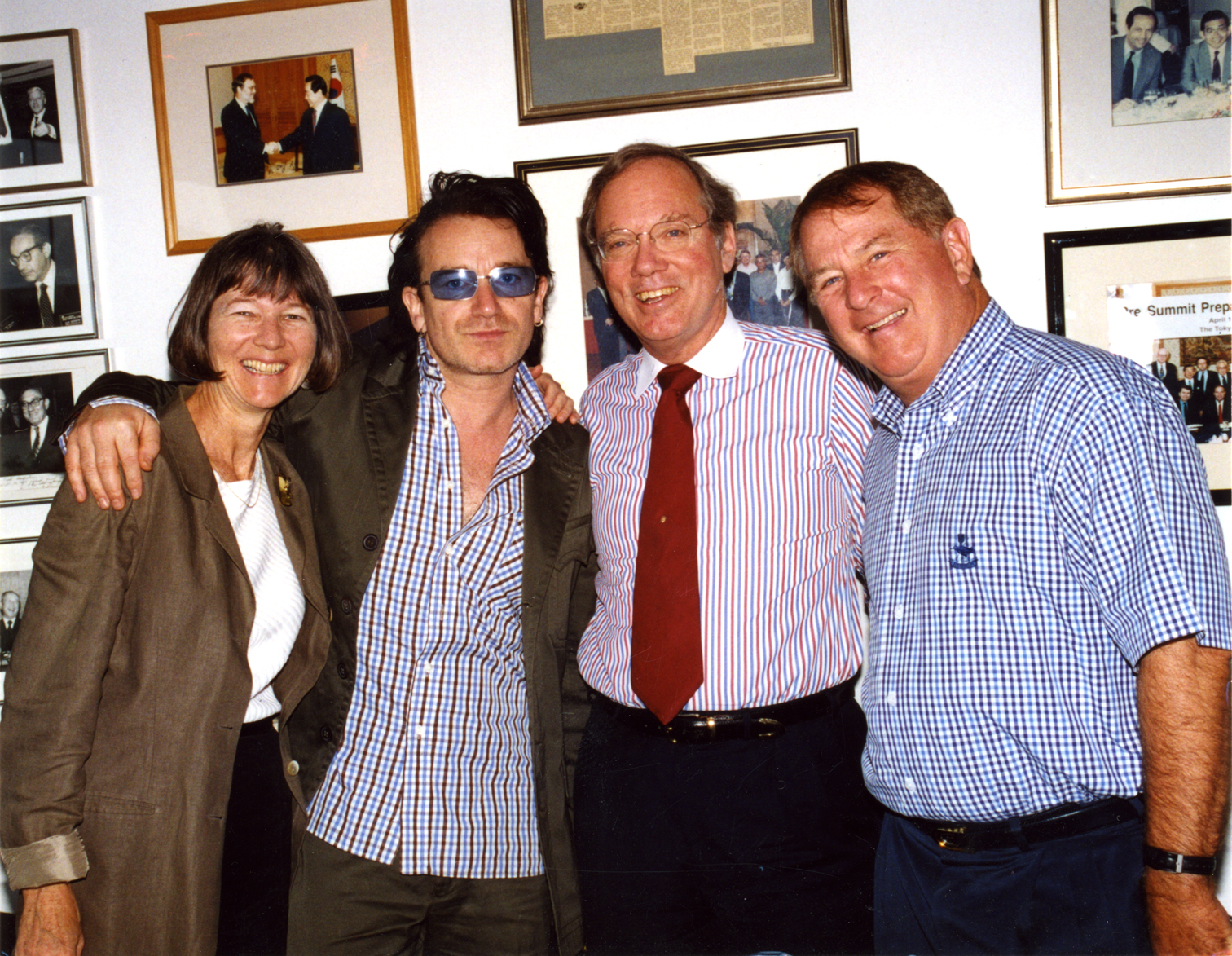 Photo courtesy CGD.
Photo courtesy CGD.
Birdsall at the Center for Global Development in its early days (2002), with rock star and humanitarian activist Bono, and her CGD co-founders C. Fred Bergsten and Edward Scott.
A winding path economics
Early in life, Birdsall moved quickly from one interest to the next. As an undergraduate student at the all-women’s Newton College of the Sacred Heart, she started as an English major before switching to American Studies on a whim. The decision had unintended benefits: it introduced her to entirely new topics and concepts.
“I guess I have always been a bit of a dilettante, driven by curiosity more than a clear career path,” she said in a recent interview with EGC. “In college, I abandoned being an English major because I didn’t want a requirement to take Olde English to crowd out other courses in my final semesters. I got permission to major in the then new field of American Studies, and I took courses in political science, American history, and US constitutional law.”
She continued this exploration in graduate school, obtaining a Master’s in International Relations at Johns Hopkins University’s Paul H. Nitze School of Advanced International Studies in 1969. She again took a new direction during this time, choosing Africa as her region of concentration and writing on the Kenyan independence movement from British colonialism.
Birdsall was introduced to economics during one of her first jobs out of graduate school: as a social science analyst for the Smithsonian Institution, where she coordinated expert reviews of proposals from African scholars studying population issues.
“The proposals from economists had a clear logic, using data and empirical methods to test hypotheses,” Birdsall said. The program, which was funded by USAID, offered concrete examples for how quantitative analysis by local scholars could guide policies that mattered for the lives of people in developing countries. This experience convinced Birdsall to pursue further graduate study in economics.
Pioneering women at EGC and Yale Economics
Learn more about the outstanding lives and careers of women who helped found EGC and Yale Economics – and demanded greater equality in the profession.
As Birdsall set her sights on a Ph.D., her prior exposure to research on population issues led her to Yale. At the time, development economics was evolving methodologically and in scope, infusing a traditional reliance on macroeconomic models and structural analysis with newfound microeconomic and econometric techniques. Researchers in labor and agricultural economics were collecting and analyzing extensive amounts of household data – to understand questions like decision-making at the family level about family size and how family investments in human capital (health and education) interacted with poverty, income, and the development process. At Yale, economists like Paul Schultz and Mark Rosenzweig (who would both go on to direct EGC) were conducting important early work on topics of population and demography.
“There were a lot of breakthroughs happening in econometric work,” Birdsall said. “I knew enough of the literature to know where the best people were, and one of the reasons I wanted to go to Yale is that Paul and Mark were there.”
Looking back on her time at EGC, though, Birdsall emphasized the roundabout nature of her career journey. “I didn’t have a plan – and I think that’s key,” she said. “If I had a plan, it was to do work I would find satisfying and personally rewarding, and to work with people I admired and respected. Looking back, that was easy then, in an era when the US economy was booming, and professional opportunities for women were (finally) increasing.”
Thriving at Yale
At Yale, Birdsall was not the usual economics Ph.D. student. She had not taken a math class since high school, so she took undergraduate “calculus for economists” in her first year, putting off the required microeconomic and macroeconomic theory coursework until her second year. She was one of the program’s relatively few female students at the time entering in a new era just six years after Yale College first admitted women as undergraduates. On top of that, she was also a recently divorced single mother who was almost 30 years old.
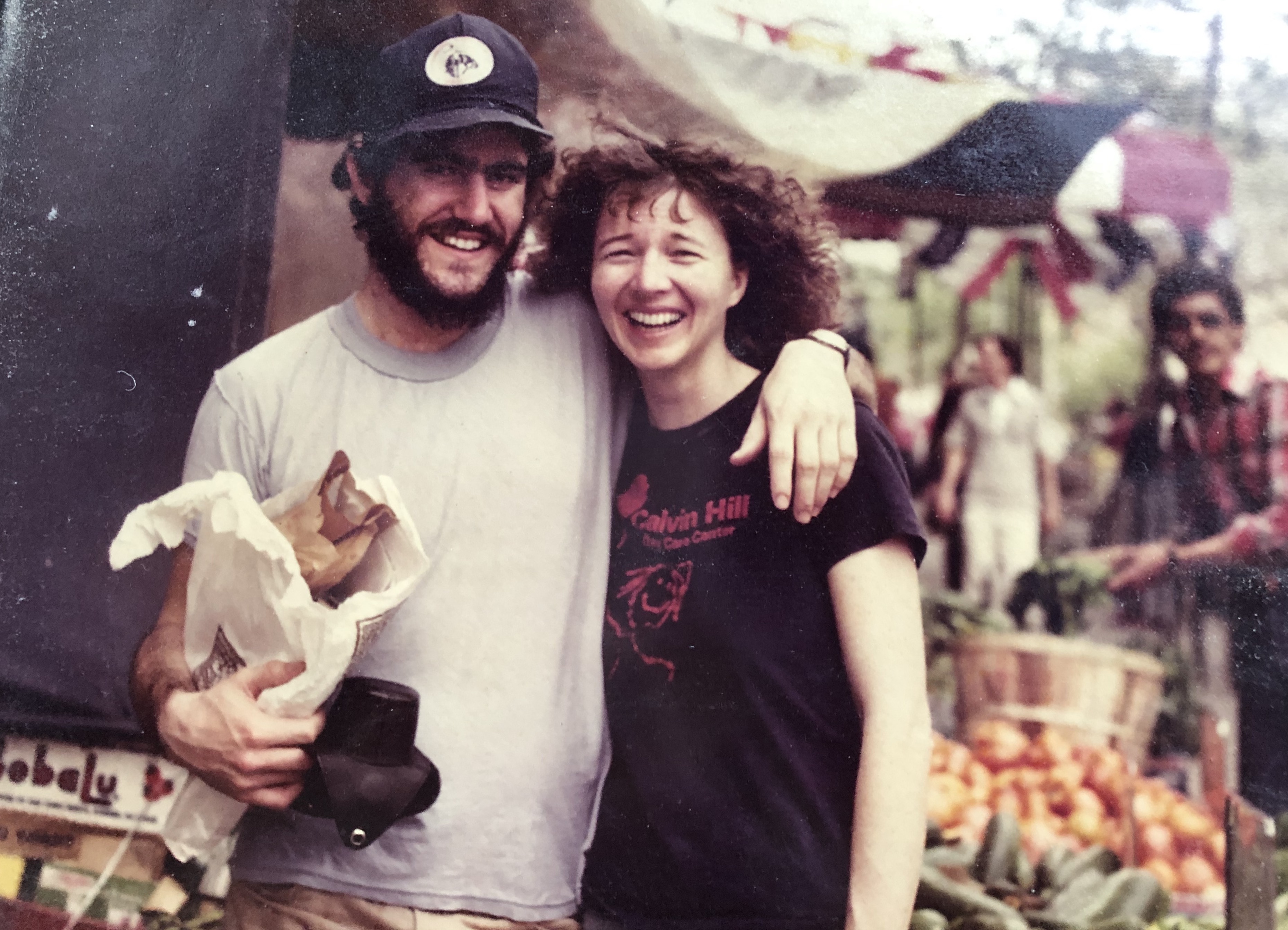 Photo courtesy Nancy Birdsall.
Photo courtesy Nancy Birdsall.
Birdsall in New York City with David Post (Y ‘72) in 1978, the time when she was working on her Yale dissertation. The couple would marry in 1982.
Despite this, she remembers being comfortable in what she describes as a good environment for women. “I had gone to all-women Catholic schools: both high school and college,” she said. “Maybe all those formative years in all-female classrooms immunized me against the cost of feeling stereotyped as a woman in what was then still overwhelmingly a male field.”
Birdsall also associated the welcoming environment she found at Yale very much with EGC, as the “center” where key (male) faculty were leaders in fields that attracted women – topics of family economics, health, education, family planning and the determinants of success for developing economies from Taiwan to India. She recalled that, whether by coincidence or not, the EGC faculty were tremendously supportive of graduate students who were women.
Later in her career after she joined the American Economic Association as a full-fledged economist, Birdsall would learn about (and join) the Committee on the Status of Women in the Economics Profession (CSWEP), which Yale women played a key role in founding.
“I was lucky to go to Yale,” she said. “The department’s approach was to nurture students and build on their strengths, rather than the ‘weeding out’ approach of some other top economics departments. And it helped that Yale’s Calvin Hill Day Care Center was just up Prospect Street from graduate housing!”
The making of a development economist
Birdsall quickly developed close relationships with many of her professors at Yale, especially Schultz and Rosenzweig, whose research on household choices in developing countries helped shape her own research agenda.
“They were using newly available household survey data to extract lessons on the development impact of public spending,” she said. “And they were adamant about using good methods to avoid simple conclusions like the fact that better access to family planning services was necessarily the main reason for fertility decline in a village or country.”
Schultz and Rosenzweig both played a meaningful role in supporting Birdsall on her dissertation, where she employed simple econometric techniques – innovative at the time – to assess the effects of siblings and birth order on the educational attainment of children in Colombia. Her dissertation also examined the relevance of mothers’ labor force participation for families’ ability to optimize investments of money as well parental time in children. To conduct the analysis, she utilized a large dataset on urban schooling that had been recommended by her friend Philip Musgrove, a pioneering health economist who, at the time, had been researching urban household income and consumption throughout Latin America.
In contributing to a shift away from grand, generalized theories of the growth process, Birdsall was part of a new wave of development economists who identified large gaps in the understanding of how economies change, using new kinds of data, and employing both microeconomic and macroeconomic tools to analyze complex economic and social processes.
Finding success as a development banker
After completing her PhD, Birdsall continued to pursue these questions as a World Bank economist. In 1983-4 she became the first woman in World Bank history to oversee its annual flagship publication, the World Development Report (WDR) – which, that year, focused on population in the developing world. Yale played a role here, too: Anne Kreuger, the World Bank’s then new chief economist, reached out to Paul Schultz (a former colleague of hers at the University of Minnesota), who recommended Birdsall for the job.
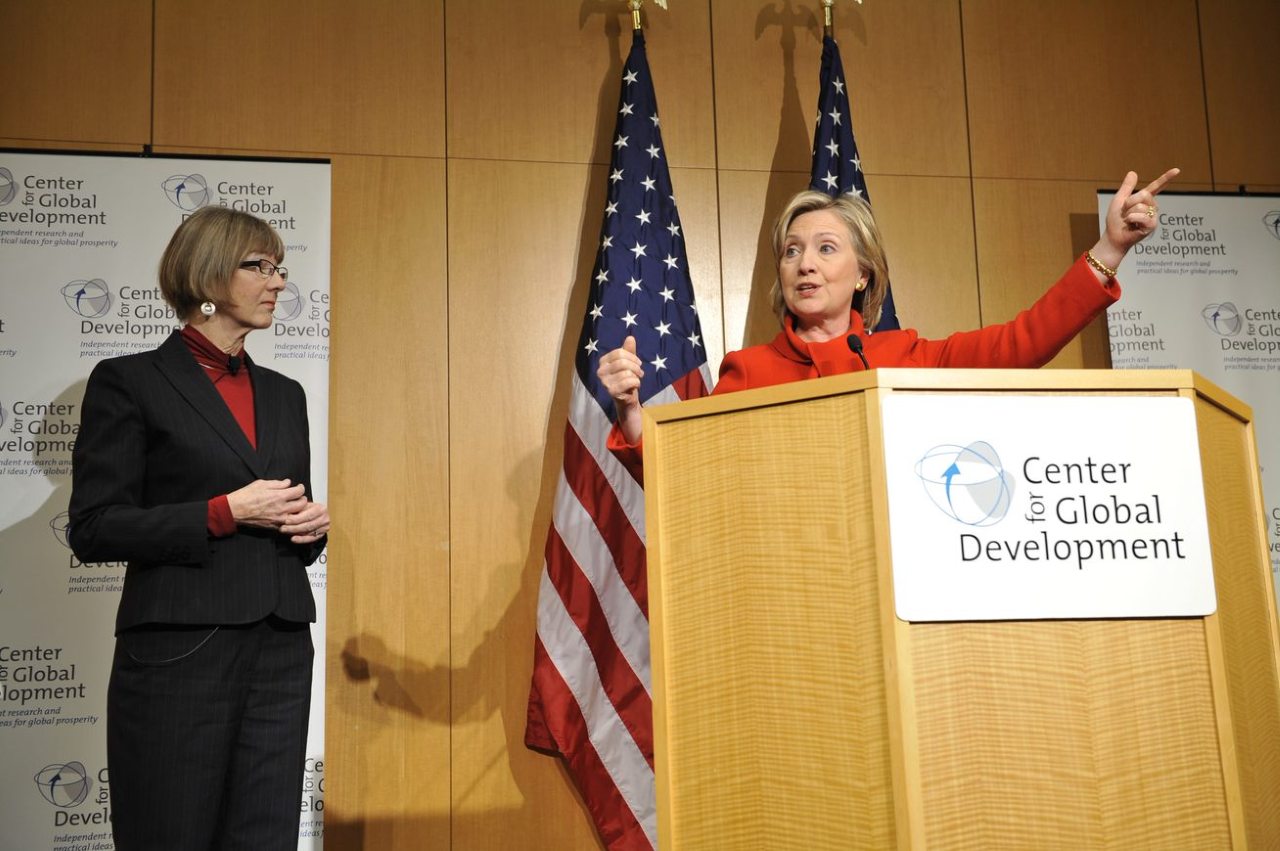 Photos courtesy CGD.
Photos courtesy CGD.
Birdsall with then Secretary of State Hillary Clinton at a CGD event in 2010.
Birdsall went on to lead the World Bank’s population, health, and nutrition policy work before she began to oversee both the Bank’s programs in Brazil and on environment across Latin America. In 1991, then-chief economist Larry Summers hired her as the first female director of the Policy Research Department, where most of the Bank’s research economists worked.
When Summers joined the Clinton Administration, he subsequently recommended Birdsall for the role of executive vice president at the Inter-American Development Bank (IDB) – a regional multilateral development bank where the president has traditionally been from Latin America and the vice president from the United States.
Birdsall would become the bank’s chief operating officer, overseeing a portfolio worth more than $30 billion. Throughout her tenure, she pushed for the institution to increase its lending, “particularly to support reform of education, health, and social security systems” throughout Latin America. She also began doing new research on Latin America’s problem of income inequality while helping to restructure the IDB and create a new Office of the Chief Economist. But after five years, she felt the need for a change.
“I was still very much an economist and a researcher, and I wanted to do new work on inequality and globalization,” she said. “So I decided to go to a think tank.”
Launching a new kind of development institution
After departing the IDB, Birdsall directed the Economic Reform Project at the Carnegie Endowment for International Peace, where she focused on globalization and inequality. She was also vocal about the appropriate roles for the international financial institutions – including the International Monetary Fund and the multilateral banks where she had worked – in global economic governance. In particular, she emphasized the benefits of greater transparency within these institutions and argued for better representation of the developing countries in these institutions’ decision-making.
She said at an IMF 2001 panel discussion: “If [International financial institutions (IFIs)] were more representative of the world's people, including the people in many emerging markets and poor countries, who are affected in their lives by the decisions made in these institutions, they might also at least consider the implications of their efforts for stability for other dimensions such as fairness, effectiveness, and so on.”
Birdsall’s insights underscored the need to realign institutional incentives around the people living in developing countries rather than the developed nations leading organizations like the World Bank or IMF. “I think management of the IFIs is fundamentally implementing decisions made by the member governments,” Birdsall pointed out in the panel. “The problem is how to [get change] in the interest not just of what…is in a Northern agenda, but in the interest of people around the world who are also affected by the decisions.”
As Birdsall was championing such reforms, a businessman and philanthropist named Ed Scott was working to establish a new DC-based think tank focused on global economic issues. Scott ultimately tapped three co-founders for the think tank: Scott, Birdsall, and her friend and colleague Fred Bergsten, a former White House and Treasury official and founding director of the Peterson Institute for International Economics.
Scott envisioned a think tank focused on global debt and efforts to use foreign aid on debt forgiveness for developing countries. Leading up to the turn of the millennium, debt among developing countries had increased steeply during the 1980s and 90s, culminating in events like the Latin Debt Crisis of the 1980s and the Asian Financial Crisis in the late 1990s, which threatened the stability of the global financial system. Birdsall (who had co-authored a book on this topic) persuaded him to broaden its scope to focus on development issues more broadly.
“Development is not just about aid,” she recalled thinking at the time. “It’s not just about money. It’s about trade, migration, the cost of and barriers to transferring technology, intellectual property issues, environment, and climate.”
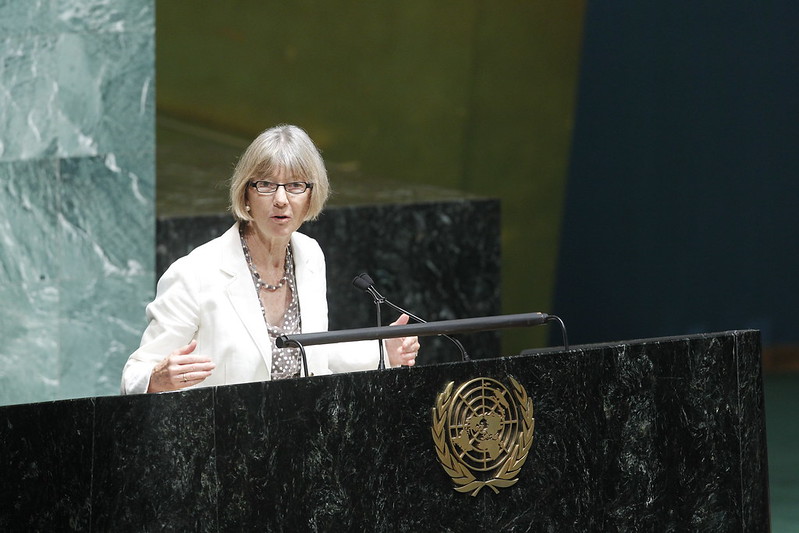 Photo courtesy CGD.
Photo courtesy CGD.
Birdsall speaking at the UN General Assembly on September 10, 2010.
The new think tank’s name reflected that breadth of focus: Center for Global Development. From the start, Birdsall prioritized independent research and analysis. She wanted CGD to rigorously assess the leading development institutions where she’d spent most of her career – and she was unafraid to hold all players accountable, especially the prominent ones. To do so, she recruited staff and fellows who shared this outlook and weren’t afraid to challenge the existing normative practices – people like William Easterly, a former colleague at the World Bank who had previously critiqued the institution for distributing aid without sufficiently measuring and assessing the outcomes of such lending.
“Nancy was the best boss I had at the World Bank Research Department – then she got even better,” Easterly told EGC. “When I had to leave as a dissident economist, she courageously gave me political asylum. I am forever grateful.”
That courage and independence became a CGD hallmark. Twenty years later, one of Birdsall’s first projects – the Commitment to Development Index, which ranked donor countries’ development policies including on aid, trade, migration, and environment – established best practices that are still followed and replicated by watchdog groups, legislative oversight bodies, and donor agencies themselves.
Moving on, and looking back
CGD’s creation coincided with major shifts in thinking about global stability and economic development. As the nature and priorities for global development evolved through the Global Financial Crisis and beyond, Birdsall’s leadership put CGD at the forefront of the field. Since its inception, the Center for Global Development has played a crucial role in some of the world’s most impactful development policies and products, including development impact bonds, “advance market” mechanisms for research on and production of vaccines targeted to poor people, analysis of the unutilized development benefits of increased international migration, and more.
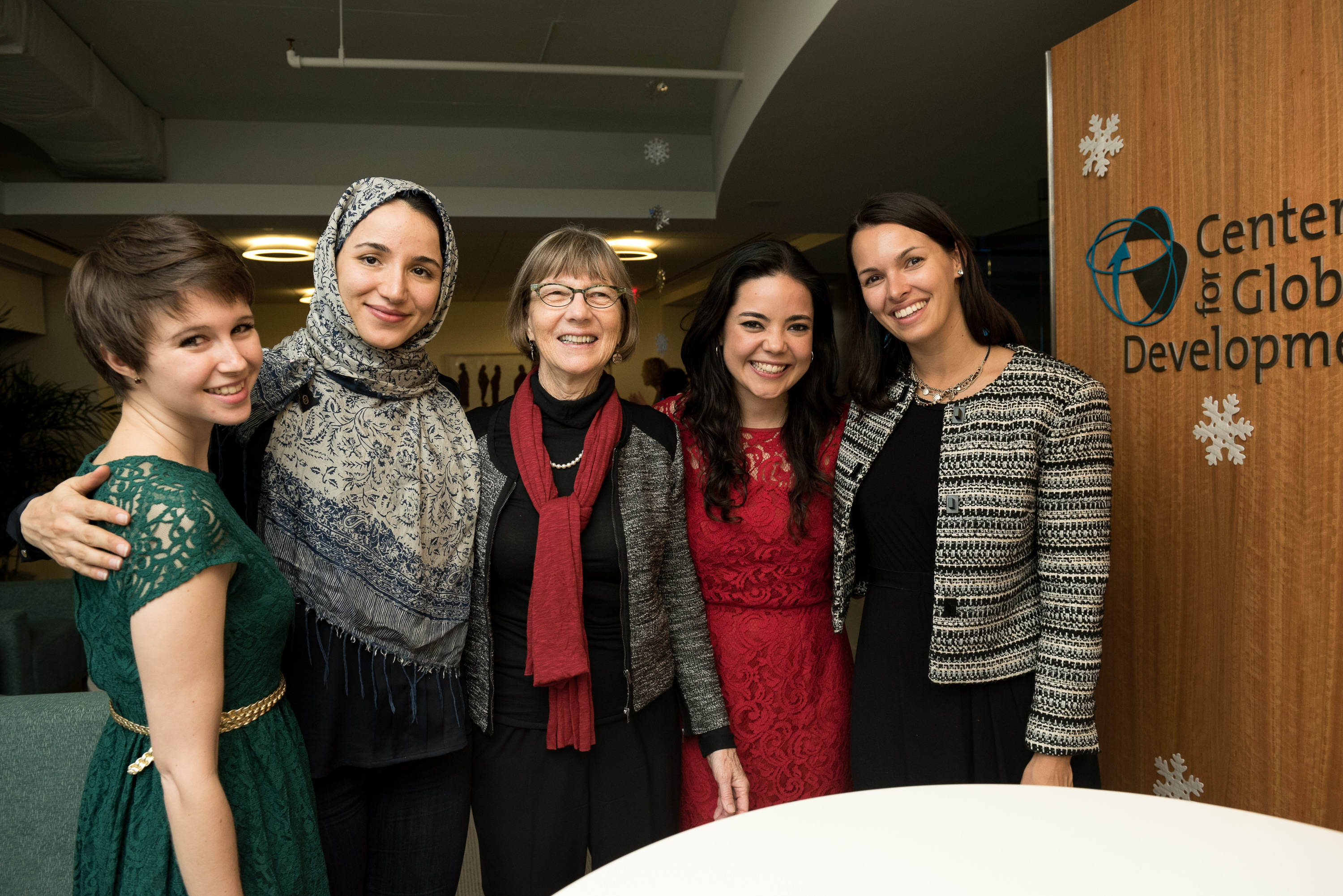 Photo courtesy CGD.
Photo courtesy CGD.
Birdsall and CGD staff members at the 2015 CGD holiday party.
In December 2016, after leading CGD for its first fifteen years, Birdsall stepped down from her role as President, but she has remained involved, serving as Senior Fellow and President Emeritus, publishing regular CGD research and commentary.
Today, as she reflects on the institutions that influenced her mindset about development, Birdsall continues to find connections to her early days as a Yale PhD student in the 1970s, working with professors at the EGC. “What does all this have to do with EGC?” she posits. “Almost everything. This entire way of thinking – the roots were very much planted while I was at the EGC.”